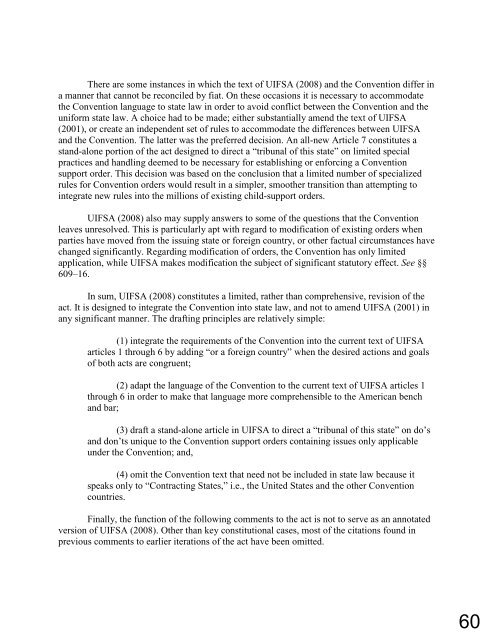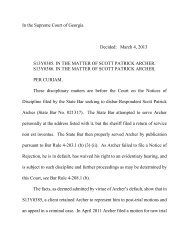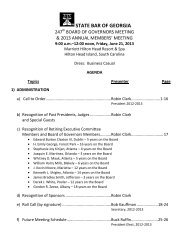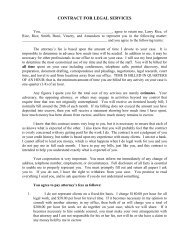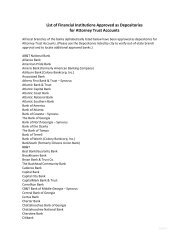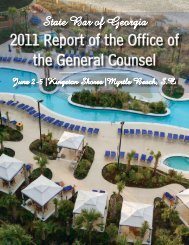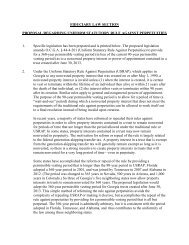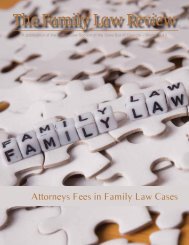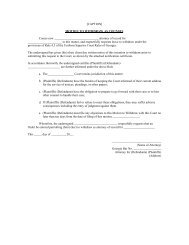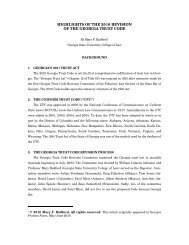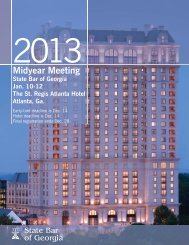2008 Amendments to the Uniform Interstate Family Support Act ...
2008 Amendments to the Uniform Interstate Family Support Act ...
2008 Amendments to the Uniform Interstate Family Support Act ...
Create successful ePaper yourself
Turn your PDF publications into a flip-book with our unique Google optimized e-Paper software.
There are some instances in which <strong>the</strong> text of UIFSA (<strong>2008</strong>) and <strong>the</strong> Convention differ in<br />
a manner that cannot be reconciled by fiat. On <strong>the</strong>se occasions it is necessary <strong>to</strong> accommodate<br />
<strong>the</strong> Convention language <strong>to</strong> state law in order <strong>to</strong> avoid conflict between <strong>the</strong> Convention and <strong>the</strong><br />
uniform state law. A choice had <strong>to</strong> be made; ei<strong>the</strong>r substantially amend <strong>the</strong> text of UIFSA<br />
(2001), or create an independent set of rules <strong>to</strong> accommodate <strong>the</strong> differences between UIFSA<br />
and <strong>the</strong> Convention. The latter was <strong>the</strong> preferred decision. An all-new Article 7 constitutes a<br />
stand-alone portion of <strong>the</strong> act designed <strong>to</strong> direct a “tribunal of this state” on limited special<br />
practices and handling deemed <strong>to</strong> be necessary for establishing or enforcing a Convention<br />
support order. This decision was based on <strong>the</strong> conclusion that a limited number of specialized<br />
rules for Convention orders would result in a simpler, smoo<strong>the</strong>r transition than attempting <strong>to</strong><br />
integrate new rules in<strong>to</strong> <strong>the</strong> millions of existing child-support orders.<br />
UIFSA (<strong>2008</strong>) also may supply answers <strong>to</strong> some of <strong>the</strong> questions that <strong>the</strong> Convention<br />
leaves unresolved. This is particularly apt with regard <strong>to</strong> modification of existing orders when<br />
parties have moved from <strong>the</strong> issuing state or foreign country, or o<strong>the</strong>r factual circumstances have<br />
changed significantly. Regarding modification of orders, <strong>the</strong> Convention has only limited<br />
application, while UIFSA makes modification <strong>the</strong> subject of significant statu<strong>to</strong>ry effect. See §§<br />
609–16.<br />
In sum, UIFSA (<strong>2008</strong>) constitutes a limited, ra<strong>the</strong>r than comprehensive, revision of <strong>the</strong><br />
act. It is designed <strong>to</strong> integrate <strong>the</strong> Convention in<strong>to</strong> state law, and not <strong>to</strong> amend UIFSA (2001) in<br />
any significant manner. The drafting principles are relatively simple:<br />
(1) integrate <strong>the</strong> requirements of <strong>the</strong> Convention in<strong>to</strong> <strong>the</strong> current text of UIFSA<br />
articles 1 through 6 by adding “or a foreign country” when <strong>the</strong> desired actions and goals<br />
of both acts are congruent;<br />
(2) adapt <strong>the</strong> language of <strong>the</strong> Convention <strong>to</strong> <strong>the</strong> current text of UIFSA articles 1<br />
through 6 in order <strong>to</strong> make that language more comprehensible <strong>to</strong> <strong>the</strong> American bench<br />
and bar;<br />
(3) draft a stand-alone article in UIFSA <strong>to</strong> direct a “tribunal of this state” on do’s<br />
and don’ts unique <strong>to</strong> <strong>the</strong> Convention support orders containing issues only applicable<br />
under <strong>the</strong> Convention; and,<br />
(4) omit <strong>the</strong> Convention text that need not be included in state law because it<br />
speaks only <strong>to</strong> “Contracting States,” i.e., <strong>the</strong> United States and <strong>the</strong> o<strong>the</strong>r Convention<br />
countries.<br />
Finally, <strong>the</strong> function of <strong>the</strong> following comments <strong>to</strong> <strong>the</strong> act is not <strong>to</strong> serve as an annotated<br />
version of UIFSA (<strong>2008</strong>). O<strong>the</strong>r than key constitutional cases, most of <strong>the</strong> citations found in<br />
previous comments <strong>to</strong> earlier iterations of <strong>the</strong> act have been omitted.<br />
60


